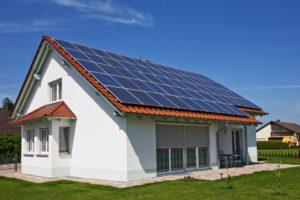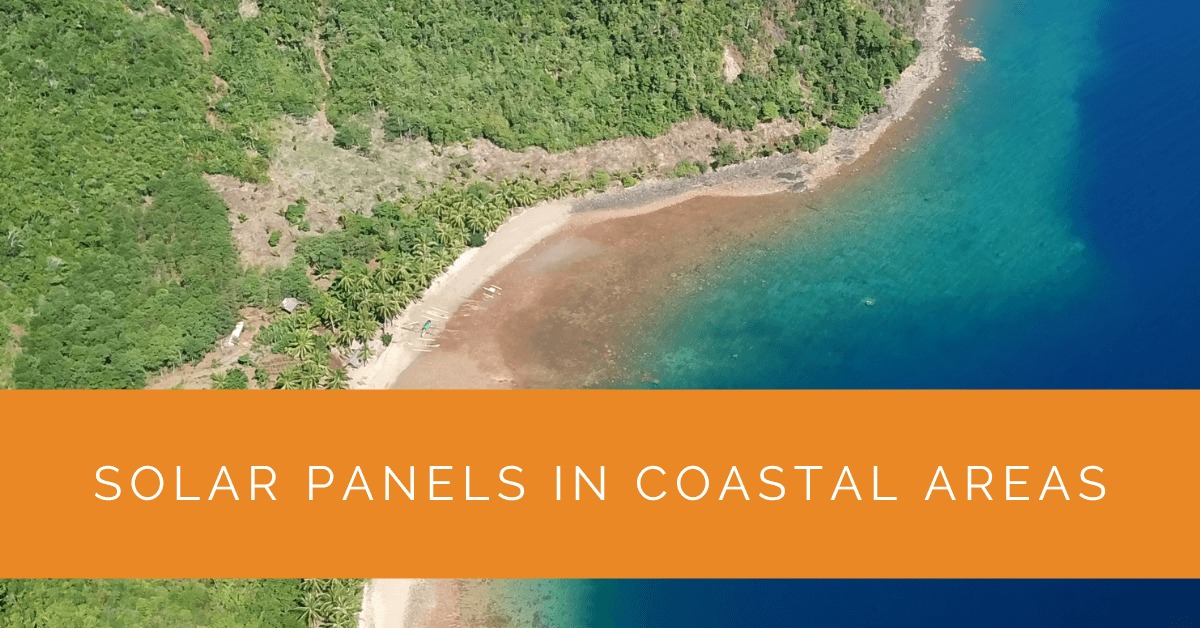Coastal regions offer a promising landscape for harnessing solar energy due to their ample sunlight and proximity to water bodies. However, the salty and humid environment poses significant challenges to solar panels. In this article, we will explore the impact of salt and humidity on solar panels, the corrosion-related issues faced by coastal solar installations, and effective strategies to ensure the longevity and efficiency of solar energy systems in such environments.
Contents
- 1 Key Takeaways
- 2 Corrosion and Its Impact on Solar Panels
- 3 Salt and Humidity: A Menace to Solar Panels
- 4 Strategies for Solar Panel Corrosion Resistance
- 5 Best Practices for Maintaining Solar Panels in Coastal Areas
- 6 Case Study: Coastal Solar Installation and Maintenance
- 7 Expert Insights From Our Solar Panel Installers About Solar Panels in Coastal Areas
- 8 Experience Solar Excellence with Us!
- 9 Conclusion
- 10 FAQ
Key Takeaways
- Coastal environments pose significant challenges to solar panels due to salt and humidity, leading to corrosion, potential induced degradation (PID), and light and elevated temperature-induced degradation (LeTID).
- Salt mist tests simulate coastal conditions and help identify weaknesses in panel design while employing corrosion-resistant materials, protective coatings, and innovative technologies that can enhance panel resilience in coastal areas.
- Regular cleaning, monitoring, and professional maintenance are crucial to maximize the efficiency and lifespan of solar panels in coastal regions.
Corrosion and Its Impact on Solar Panels
Solar panels contain various materials, including metals like aluminum and copper, susceptible to corrosion when exposed to saltwater and humidity. Corrosion occurs when these metals react with the corrosive elements, leading to degradation and panel failure.
Potential Induced Degradation (PID) and its Relation to Corrosion
Solar panels are more prone to PID in coastal areas due to salty air. PID can cause a drop in the output of solar panels, affecting their overall performance and energy yield. The combination of PID and corrosion can accelerate the degradation process, significantly reducing the lifespan of solar panels.
Light and Elevated Temperature Induced Degradation (LeTID) and its Effects on Coastal Solar Panels
Coastal environments also expose solar panels to elevated temperatures, intensifying LeTID effects. LeTID, a relatively recent concern in the photovoltaic (PV) industry, reduces solar cell performance. When coupled with corrosion, LeTID can lead to additional efficiency losses, affecting the overall energy generation of the solar panel system.
Salt and Humidity: A Menace to Solar Panels
Salt mist, a common coastal condition, can severely threaten solar panels. The corrosive nature of saltwater makes it highly damaging to panel materials, including the protective glass, frame, and junction box.
How Salt Mist Tests Simulate Coastal Conditions
To assess the impact of salt mist on solar panels, manufacturers conduct salt mist tests. These tests involve subjecting the solar panels to a controlled environment exposed to a saline mist. By simulating coastal conditions, these tests help identify potential weaknesses in panel design and materials, allowing for improvements to enhance corrosion resistance.
Analyzing the Impact of Humidity on Solar Panel Efficiency
Humidity in coastal areas further exacerbates corrosion. Moisture can penetrate the protective layers of solar panels, leading to electrical malfunctions and reducing the efficiency of the solar cells. The junction box, a critical component of the solar panel, is particularly vulnerable to damage from humidity, potentially resulting in complete panel failure.

Strategies for Solar Panel Corrosion Resistance
To combat the corrosive effects of salt and humidity, it is essential to employ appropriate strategies during the solar panel’s design, module construction, and installation process.
Module and Inverter Design for Coastal Environments
Manufacturers are increasingly developing modules and inverters specifically designed to withstand the harsh conditions of coastal areas. These modules often include anti-corrosive coatings and use materials that are more resistant to degradation caused by saltwater and humidity. Additionally, specialized junction boxes with enhanced sealing properties safeguard the internal components from moisture intrusion.
Protective Coatings and Materials to Resist Corrosion
Coastal solar installations benefit from advanced protective coatings, such as marine-grade paints and anodized aluminum frames. These coatings form an additional barrier against salt mist and humidity, safeguarding the solar panels from premature corrosion. Selecting high-quality materials, like stainless steel fasteners, also helps prevent accelerated degradation caused by coastal environments.
Innovations in Solar Panel Technology to Combat Coastal Challenges
The solar industry continually seeks innovative solutions to enhance the resilience of solar panels in coastal areas. Researchers are exploring new materials and nanotechnologies that exhibit superior corrosion resistance. Integrating such advancements into solar panel manufacturing ensures the panels can endure the harsh coastal environment for extended periods, maximizing their efficiency and energy output.
Best Practices for Maintaining Solar Panels in Coastal Areas
Maintaining solar panels in coastal regions is crucial to ensuring their optimal performance and longevity.
Regular Cleaning and Maintenance Regime
Due to the corrosive nature of saltwater, regular cleaning of solar panels is essential. Cleaning helps remove salt deposits and other pollutants that may accumulate on the panel surface, hindering sunlight absorption. A routine maintenance regime also includes inspecting the panel frames, junction boxes, and other components for signs of corrosion or damage.
Monitoring and Early Detection of Corrosion
Installing a monitoring system to track the performance of solar panels can aid in the early detection of efficiency losses caused by corrosion or PID. Timely identification of issues allows for prompt action, reducing the impact of corrosion and maximizing the energy generation potential of the solar system.
Professional Inspection and Repair Services
Enlisting the services of professional solar panel installers and maintenance experts is crucial for coastal installations. These professionals have the expertise and experience to effectively detect and address corrosion-related issues. Regular inspections and swift repair and replacement of damaged components ensure the system remains reliable and efficient.
Case Study: Coastal Solar Installation and Maintenance
Background
Solar Panels Network USA is dedicated to providing sustainable energy solutions tailored to various environmental conditions. One of our significant projects involved installing solar panels in a coastal region, where the impact of salt and humidity posed unique challenges to the longevity and efficiency of the solar systems.
Project Overview
Our mission was to design, install, and maintain a robust solar energy system for a residential community located near the coast. The project aimed to maximize energy production while ensuring the durability of the solar panels in a harsh, salt-heavy environment.
Implementation
Initial Assessment and Planning
We began with a comprehensive assessment of the coastal environment, focusing on the specific challenges presented by salt and humidity. This included analyzing historical data on weather patterns and consulting with local experts to understand the environmental impact on solar panel performance.
Selecting Corrosion-Resistant Materials
To address the risk of corrosion, we selected high-quality, corrosion-resistant materials. The solar panel frames were made of anodized aluminum, known for its durability against salty air. We also used stainless steel fasteners and marine-grade coatings to provide an extra layer of protection against corrosion.
Innovative Design and Technology Integration
We incorporated advanced technologies to combat Potential Induced Degradation (PID) and Light and Elevated Temperature Induced Degradation (LeTID). The solar modules were equipped with PID-resistant features, and we used smart inverters with real-time monitoring capabilities. This allowed us to detect and address any efficiency losses promptly.
Results
Enhanced Durability and Efficiency
The use of corrosion-resistant materials and innovative technologies resulted in enhanced durability and efficiency of the solar panels. Regular monitoring ensured early detection of any issues, allowing for quick interventions and maintaining optimal performance.
Community Engagement and Education
We conducted workshops and training sessions for the residents, educating them on the importance of regular maintenance and how to identify potential issues. This proactive approach fostered a sense of ownership and responsibility within the community, ensuring the longevity of the solar installations.
Positive Environmental Impact
By ensuring the efficiency and durability of the solar panels, the project significantly contributed to reducing the community’s reliance on fossil fuels. The successful implementation of this project demonstrated the viability of solar energy in coastal regions and its role in promoting sustainable living.
Summary
This project showcased the importance of using corrosion-resistant materials, advanced coatings, and innovative technologies to ensure the durability and efficiency of solar panels in coastal environments. Through careful planning, community engagement, and a commitment to sustainability, Solar Panels Network USA successfully harnessed solar energy in a challenging coastal region, setting a precedent for future installations.
Expert Insights From Our Solar Panel Installers About Solar Panels in Coastal Areas
Coastal environments demand robust solar solutions. Using corrosion-resistant materials and regular maintenance ensures that solar panels perform efficiently despite the challenges posed by salt and humidity.
Senior Solar Technician
In coastal areas, the combination of advanced coatings and innovative technology is vital to combat the effects of salt and humidity. Regular inspections are key to maintaining system integrity.
Solar Installation Expert
Designing solar systems for coastal regions requires a strategic approach. We focus on using marine-grade materials and implementing effective monitoring systems to prolong the lifespan and efficiency of solar panels.
Renewable Energy Engineer
Experience Solar Excellence with Us!
Trust in Solar Panels Network USA, where our seasoned experts deliver top-quality solar solutions for homes and businesses nationwide. With a legacy of countless successful installations and a commitment to sustainable energy, we’re your reliable partner in the solar journey. Ready for a brighter, eco-friendly future? Call us now at (855) 427-0058 and harness the power of the sun!
Conclusion
Harnessing solar energy in coastal areas is a promising avenue for renewable energy generation. However, the corrosive nature of salt and humidity poses significant challenges to solar panel installations. To combat corrosion and ensure the longevity and efficiency of solar energy systems in coastal regions, employing corrosion-resistant materials, advanced coatings, and innovative technologies is imperative. By adhering to best practices for maintenance and monitoring, we can harness the power of solar energy sustainably, even in the harshest coastal environments.
FAQ
Does salt affect solar panels?
Yes, salt can have a detrimental impact on solar panels, especially in coastal areas. The salty air and mist can corrode panel materials, leading to efficiency losses and potential panel failure.
Are solar panels saltwater-proof?
While solar panels are designed to be durable, they are not entirely saltwater-proof. The corrosive nature of saltwater can damage panel components over time, necessitating proper design, materials, and maintenance to enhance their resistance to coastal conditions.
Do solar panels work on the coast?
Yes, solar panels can work effectively on the coast and harness the abundant sunlight in such regions. However, to ensure optimal performance and longevity, it is crucial to implement corrosion-resistant strategies, regular cleaning, and professional maintenance tailored to the coastal environment.
About the Author
Solar Panels Network USA stands at the forefront of solar energy solutions, driven by a team of seasoned solar engineers and energy consultants. With over decades of experience in delivering high-quality solar installations and maintenance, we are committed to promoting sustainable energy through customer-centric, tailored solutions. Our articles reflect this commitment, crafted collaboratively by experts to provide accurate, up-to-date insights into solar technology, ensuring our readers are well-informed and empowered in their solar energy decisions.

